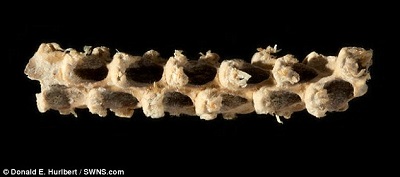A prehistoric corn cob dating back 5,310 years has shed fresh light on the domestication of the world’s most popular cereal according to Daily mail.
Scientists have sequenced its complete DNA to show the maize grown in central Mexico was genetically more similar to its modern descendant than its wild ancestor.
For example, the ancient maize already carried mutations responsible for making kernels soft, a common feature of today’s corn.
Over the course of several thousand years, human driven selection caused major physical changes, turning the unproductive plant into modern maize, commonly known as corn.
‘Maize as we know it looks so different from its wild ancestor that a couple of decades ago scientists had not reached a consensus regarding the true ancestor of maize.’
Since the discovery of the cob, one of the five oldest known in the world, it has been housed in the Robert S.
The study was only possible because the ancient specimen had been unusually well preserved.
Dr Wales said: ‘Archaeological specimens frequently have high levels of bacterial DNA due to decomposition and soil contaminants.
‘However, during genetic testing of ancient cobs, we were astonished to find 70 per cent of the DNA from the Tehuacan162 cob was from the plant!’
Most other ancient samples contain less than 10 per cent plant DNA.
Tehuacan162 did not have hard seed coats like its wild ancestor would have.
But, the ancient cob is less than a tenth of the size of modern cobs, at less than two centimetres long.
In addition, it produced just eight rows of kernels, about half that of modern maize.
That led the researchers to suspect its genes would offer clues on the early stages of maize domestication.
To make the most of the small sample, the researchers used cutting edge paleogenomic techniques.
They extracted DNA with a method designed to recover ultra short DNA, taking special care to avoid losing any genetic material.
As a result, the researchers were able to prepare sufficient DNA for sequencing while still preserving enough of the sample to determine the cob’s precise age via radiocarbon dating.
The new findings offer an informative snapshot in the 10,000-year evolutionary history of maize and its domestication.
In addition to elucidating how maize provided a dietary foundation for ancient civilizations, such studies can also aid in understanding and improving commercially important lines of modern maize, the researchers say.
Co author Jazmin Ramos-Madrigal, a PhD student, added: ‘This is only the beginning of the story.
‘We want to know how humans dispersed it, which routes they took, and how maize adapted to such diverse environments.’
N.H.Kh

